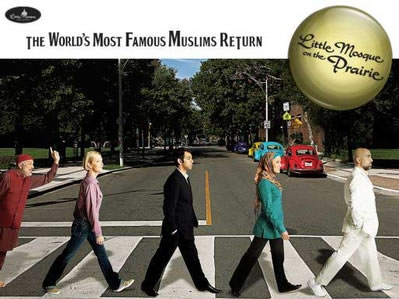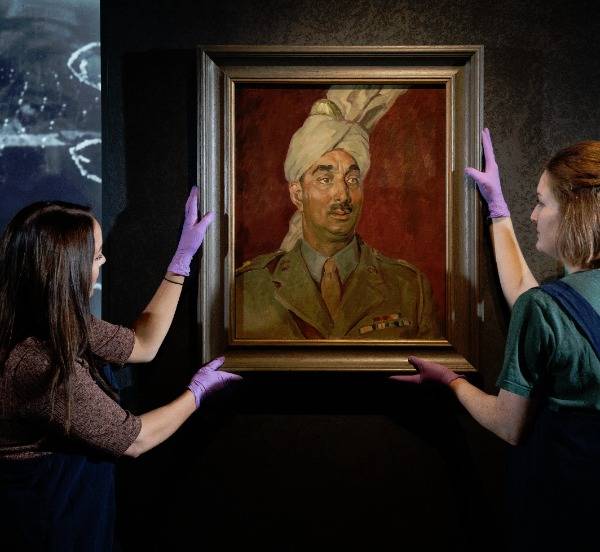 Imagine a sitcom featuring a Muslim community which has settled in a small prairie town where white locals suspect them of terrorism and fundamentalism. It has jokes about suicide bombing, polygamy and inter-religious sex; it has a love triangle involving a young Muslim woman, and an Imam whose ludicrous sermons make him a figure of fun even among his congregation; and it can also boast a range of comic references to 9/11. And yet Little Mosque on the Prairie has for the past two years been one of the most popular comedies on Canadian television.
Imagine a sitcom featuring a Muslim community which has settled in a small prairie town where white locals suspect them of terrorism and fundamentalism. It has jokes about suicide bombing, polygamy and inter-religious sex; it has a love triangle involving a young Muslim woman, and an Imam whose ludicrous sermons make him a figure of fun even among his congregation; and it can also boast a range of comic references to 9/11. And yet Little Mosque on the Prairie has for the past two years been one of the most popular comedies on Canadian television.
It may not be that surprising that, with its snappy dialogue and intelligent storylines, Little Mosque on the Prairie is enjoying success in tolerant, liberal-minded Canada.
But it’s also being broadcast, to wild acclaim, in France, Switzerland, Finland, Israel, the West Bank, Gaza, the United Arab Emirates, Turkey, and certain French-speaking African countries.
No one is out on the streets demanding a fatwa or a ritual burning. No one has yet condemned it for blasphemy or called for it to be erased from the schedules. Instead, even in the most devout Islamic countries people seem to be enjoying it. And part of the secret of its success is that the main gags stem from the reaction of the white townsfolk to Islamic attitudes and practices, and the tensions created by narrow-minded assumptions and media sensationalism. In the first episode, for example, which sees the congregation establishing their mosque in a disused parish hall, the buildings caretaker overhears their devotions and scarpers off to call a terror hotline. When the local minister explains to him that the church has rented the building out as a pilot project, terror paralyses his face. “They’re training pilots?” he shrieks.
When Amaar, a young Muslim lawyer played by Zaib Shaikh, gives up his practice and flies in from Toronto to take over as the Imam, he is arrested by airport security who overhear him talking on his mobile phone about having committed “career suicide”. When the security guard phones Amaar’s cousin’s construction firm to confirm his story he hears the answerphone message state, “We blow away the competition!”, sending the officers into a frenzy and lengthening Amaar’s detention.
 But the writers do not spare conservative Islam, either. The paranoid sermons of the aging bumbling Imam, Baber Siddiqui, gleefully poke fun at the irrationality of draconian Islamic thinking. “The enemy is not only out there,” he intones, finger raised, “The enemy is in your kitchen. Wine gums! Rye bread! Liquor-ice! Western traps designed to seduce Muslims to drink alcohol!” The status of women in Islam is also central, most strikingly embodied in the character of Rayyan, a twenty-something Muslim feminist who uses common sense to campaign for equality in the mosque and at home, as well as freedom of choice in her personal life and relationships.
But the writers do not spare conservative Islam, either. The paranoid sermons of the aging bumbling Imam, Baber Siddiqui, gleefully poke fun at the irrationality of draconian Islamic thinking. “The enemy is not only out there,” he intones, finger raised, “The enemy is in your kitchen. Wine gums! Rye bread! Liquor-ice! Western traps designed to seduce Muslims to drink alcohol!” The status of women in Islam is also central, most strikingly embodied in the character of Rayyan, a twenty-something Muslim feminist who uses common sense to campaign for equality in the mosque and at home, as well as freedom of choice in her personal life and relationships.
Early in the series, she opposes Baber’s plan to construct a concrete barrier to create separate prayer areas for men and women. Accusing him of medieval thinking, Rayyan is close to dissuading him when Fatima, a traditional African Muslim woman, votes for the barrier. To settle the matter, the new Imam, Amaar, decrees that half the mosque will have the barrier, and half won’t, allowing individual worshippers to make up their own minds. When this draws protests from all the congregants, Amaar tells them, “It’s the perfect Muslim solution; nobody’s happy!”
Little Mosque is the creation of Zarqa Nawas, a British-Canadian film-maker who runs a production company called FUNdamentalist Films from Toronto. Her trademark is the use of satirical humour to deconstruct prevalent Islamic stereotypes, an art she has honed in a trio of comedies – BBQ Muslims (about a Muslim whose exploding barbecue puts him under suspicion of terrorism), Death Threat (a comedy based on the Salman Rushdie affair) and Real Terrorists Don’t Belly Dance.
Canada has her own history of cultural and religious tensions and fundamentalist activity, but Little Mosque has nevertheless, or perhaps because of this, gone down well with the whole population – including its Muslims. This could well be because, as Nawas herself points out, the jokes are aimed at people, not prophets. She has what we might call comedic humanist vision – the assumption that under the skin we are all equally ridiculous. This could account for her show’s success even in more religiously conservative parts of the Middle East, where it is a hugely popular download. And the reason? They find it very funny.
There are lots of clips from Little Mosque on the Prairie available on YouTube

